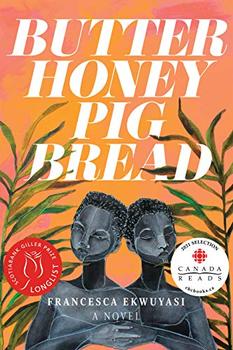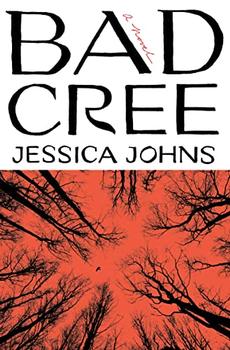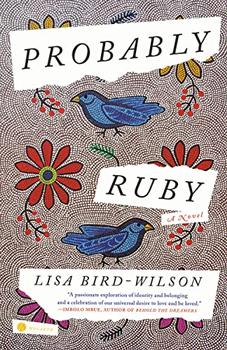Summary | Excerpt | Reviews | Beyond the book | Read-Alikes | Genres & Themes | Author Bio

For a long time, my favorite movie was Love Songs, a French musical film directed by Christophe Honoré that tells an oddly beautiful story of death, love and uncertainty. Its sadder elements are balanced by its forthright innocence, attention to detail and unrelenting drift towards romance at even its most mournful turns. It flouts many artistic and cultural expectations, including heterosexuality, realism and the standard flow of dialogue and story, and does so with a shrug.
Butter Honey Pig Bread by Francesca Ekwuyasi reminds me of Honoré's film in its audacity, its unconventionality and the way in which it casually commits to inhabiting a world of its own making. Ekwuyasi's novel does not contain music, of course, but it encompasses a loose collection of recipes and culinary experiences that enhance the texture and color of the plot, comprising a sort of playful narrative scrapbook of food and relationships, both familial and romantic. This format makes the work feel like an ongoing celebration, a story of lighter consistency in happy and sad moments alike.
The novel introduces Kambirinachi, who is an Ogbanje, a spirit destined to die young and be reborn repeatedly. Kambirinachi resists the pull of her fate to remain in the world through adulthood, a decision that is painful and compromising for her but allows her to eventually marry the man she loves and birth two daughters, Taiye and Kehinde. Due to a traumatic event in their youth in which Kehinde is assaulted by a houseguest, a rift grows between the sisters and haunts them as they live separate existences between Nigeria, England, France and Canada. Taiye, plagued by guilt for not having protected her sister, struggles to find happiness with various lovers as she pursues an interest in cooking, while Kehinde suffers an unexpected loss but finds solace in drawing.
The sisters' food adventures stretch far in both tradition and location. While Taiye is the aspiring chef of the family, Kehinde works for a while as a server at a restaurant in Montreal, where she falls in love with a line cook, Wolfie, who makes his own kombucha and kimchi at home. Taiye has her first sexual experience with Elodie, a woman running a Catalan cuisine program in Montpellier, and later begins seeing Salomé, a professor in Halifax who cooks stir-fried rice and marinated mushrooms for her early in their relationship. The present storyline takes place in Lagos, when Taiye has arrived back at her childhood home after some time away and Kehinde comes to visit with her husband Farouq. As Taiye flails towards a resolution with Kehinde, she copes with her feelings of helplessness by preparing food for her family. Her efforts range from jollof rice and Agege bread (see Beyond the Book) to a salted chocolate caramel cake served at a meal to celebrate Kehinde's homecoming.
Some of the dialogue in Butter Honey Pig Bread, specifically between Taiye and her friends and lovers, feels rushed, with many passages consisting of short, blunt lines of unattributed speech that could occasionally benefit from dilution with prose for smoother reading. This isn't to say that the exchanges are unrealistic, and as part of a TV or film script in the hands of competent actors, they might be perfectly serviceable. Even on the page, their naked quality gives off a certain charm, but against the rest of the narrative they sometimes stick out like a raw ingredient that Taiye may have prepped but forgotten to blend into one of her recipes.
However, this minor shortcoming does nothing to restrict the book's masterful use of structure. Rather than telling the story in chronological order or splitting the novel into full separate accounts of each character's life, Ekwuyasi chooses to alternate between family members as if building an elaborate layer cake, revealing in measured portions how Kambirinachi, Taiye and Kehinde all come of age while balancing love interests and life callings. The novel seems to enter and leave each character's storyline at times when the reader's interest is at its peak, which causes the format to appear deliberately episodic. This approach also has the effect of making Kambirinachi's sense of timelessness and proximity to death feel more immediate and comprehensible.
As Butter Honey Pig Bread delves into the details of its characters' lives, it delineates but also transcends their trauma, fears and limitations. Kambirinachi's story implies that life is about much more than survival, and her everyday experiences, along with those of her daughters, give the sense that temporary, frivolous pleasures are both their own reward and a way of building meaning over time.
![]() This review
first ran in the January 6, 2021
issue of BookBrowse Recommends.
This review
first ran in the January 6, 2021
issue of BookBrowse Recommends.

If you liked Butter Honey Pig Bread, try these:

by Jessica Johns
Published 2023
In this gripping, horror-laced debut, a young Cree woman's dreams lead her on a perilous journey of self-discovery that ultimately forces her to confront the toll of a legacy of violence on her family, her community and the land they call home.

by Lisa Bird-Wilson
Published 2023
An Indigenous woman adopted by white parents goes in search of her identity in this unforgettable debut novel about family, race, and history.
Your guide toexceptional books
BookBrowse seeks out and recommends the best in contemporary fiction and nonfiction—books that not only engage and entertain but also deepen our understanding of ourselves and the world around us.